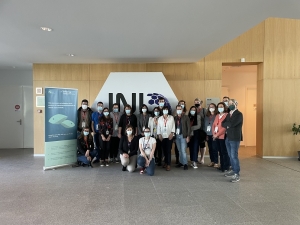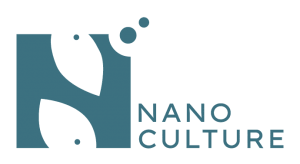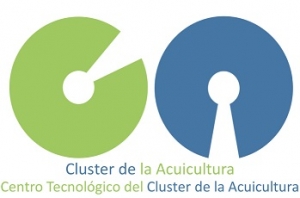Welcome to the newsletter of NANOCULTURE project
October 2022
NANOCULTURE
Risk assessment and mitigation of the presence of engineered NANOmaterials in Atlantic aquaCULTURE
___________________________________________________
NANOCULTURE aims to provide knowledge (and tools) on the presence and effects of the most-used nanoparticles (TiO2 and Ag) in the most common Atlantic Area aquaculture products (turbot, mussels, seaweed); and will assess the human risk of exposure by oral intake of these products.
___________________________________________________
NANOCULTURE webinar: Final results
The Nanoculture webinars are back!
The partners of the Nanoculture project are organizing a new edition of the webinars, entitled “NANOCULTURE Final Results”. These will be the last events of the project and the participants will have the opportunity to learn about the conclusions of the project studies. Check the dates below:
- French speaking session: October 18th, between 14:00 and 15:30 (Paris time).
- English speaking session: October 24th, between 14 and 15:30 (London/Lisbon time).
- Portuguese speaking session: October 25th, between 14 and 15:30 (London/Lisbon time).
- Spanish speaking session: October 27th, between 11:00 and 12:30 (Madrid time).
Contributions from invited speakers from aquaculture industry and research sectors will enrich the event. You can visit the website of the project to register at the event (https://nanoculture.ciimar.up.pt/) and subscribe to the project newsletter to keep informed. Relevant information will also be presented on the social media of the project (Twitter and Linkedin accounts).
___________________________________________________
CETGA presentation
In each NANOCULTURE newsletter, we introduce one of the project partners. In this edition, the chosen partner is CETGA.
The Cluster de la Acuicultura is a research centre that was established in 2001, promoted by the turbot producer companies based in Spain at that time. Nowadays, the group includes producers of other species located throughout the European geography. At the same time, the Centro Tecnológico del Cluster de la Acuicultura (CETGA) was established to increase the competitiveness of companies in the aquaculture sector. CETGA is registered as an innovation support centre by the Spanish government. It has facilities equivalent to an industrial fish farm, which allows performing trials under typical production conditions. These include a registered and authorized fish experimentation animal facility. Other laboratories (microbiology, autovaccines, chemical analysis, chromatography and molecular biology) are adapted with state-of-the-art technology for the study of the different disciplines. The research team is multidisciplinary with extensive experience in national and international projects.
Studies related to fish welfare are a priority for CETGA. These studies range from those related to establishing the ideal conditions during cultivation, transport and slaughter, to all issues related to health (prevention, treatment, early detection…). Prevention research is a priority and is fundamentally oriented toward the use of vaccines. CETGA facilities include an accredited BSL2 level autovaccine production. Regarding the treatment of pathologies, several pharmaceutical products have been registered for use in fish, and there are currently several products under investigation.
Caring for the environment and sustainability is a major goal for the Cluster de la Acuicultura. Several projects have been developed that address these issues, such as the eco-innovation, energy and employment for the aquaculture sector. In addition, other projects related to the improvement of the environmental parameters of marine farms have been developed.
CETGA also works in the development of the Aquaculture 4.0, with the design of novel machines, devices and sensors, promoting the digital transformation of the aquaculture field.

____________________________________
NANOCULTURE events
_
Project Final event
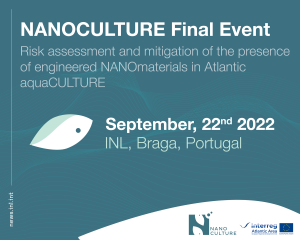
On 22nd September 2022, INL received the Final Event of the project Nanoculture. This event was open to the public and counted with the participation of 31 attendees. The event started with Carlos Garea presentation, the Project Officer of Nanoculture at the Atlantic Area Joint Secretariat, with Carlos Garea talking about upcoming funding opportunities from the Interreg Atlantic Area Program. Then, the researchers of the project consortium Begoña Espiña INL, Alexandre Campos from CIIMAR and Antonio Moreda from USC, presented the project results and there were dedicated poster sessions. During the afternoon, the attendants had the opportunity to hear the toxicologist Maria Chiara Astuto (ESFA) and Sean Kelly (Nanotechnology Industries Association) and to participate in the round table on nanosafety of food products and related topics.
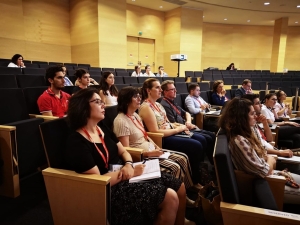
_
General Assembly – 2022
The Nanoculture general assembly took place in July 2022, in CIIMAR (Matosinhos, Portugal). This event gathered team members from Portugal (CIIMAR, INL) and Spain (CETGA, USC, UVigo) in person and also members from other countries virtually (IRMRS, AFBI, PoleAquimer).
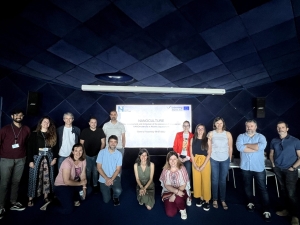
_
Consortium meeting 2021
On the 10th of November 2021, the partners of the Nanoculture project got together in person, at INL, in Braga. A two-year interruption of these physical meetings resulted from COVID-19 travel restrictions. However, in this 2021 event, the partners had the opportunity to show in person their recent results on bioaccumulation and the effects of nanoparticles on aquaculture species and advances in the development of portable sensors for nanoparticles in water matrices.
